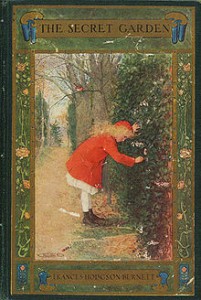Mistress Mary, quite contrary,
How does your garden grow?
With silver bells, and cockle shells,
And marigolds all in a row.
Mary Lennox is not a particularly likeable character, at least not at first. She was “a sickly, fretful, ugly” child, who always got her own way, and “was as tyrannical and selfish a little pig as ever lived.” However, she was also largely unloved, by both her parents and the servants employed to care for her‚Äìand keep her out of sight‚Äìthe implication being that her attitude is not her fault, but rather the product of her circumstances, particularly loneliness and isolation.
After her parents and most of the servants die in a cholera outbreak, Mary leaves India with an officer’s wife to go to Yorkshire, England, where she’ll live with her uncle at Misselthwaite Manor. An imposing estate, Mary circumstances seem like they’ll be much the same as in India: left alone and forgotten. Her uncle, Archibald Craven, is still mourning the loss of his wife, who died ten years previously. Mary is again left in the care of the household servants, but this time they genuinely care about her (and also won’t put up with her imperious nature).
In her boredom, Mary begins to explore the house and gardens, eventually finding both the key and the door to the “secret garden” that her maidservant, Martha, told her about. The walled rose garden is where she died, and it is for this reason that Archibald Craven buried the key. Mary’s health and attitude rapidly improve in England, as the climate suits her better (she always felt too hot in India to do anything) and she spends more time actively playing. She develops friendship with Martha and Martha’s 12 year old brother, Dickon, who helps her tend the garden. Mary also solves the mystery of the crying sound she hears in the hallways, and finds her sickly cousin Colin, who is equally imperious and lonely. The two become friends, and eventually Mary reveals the secret garden to Colin, whose health also rapidly improves (he is treated as an invalid out of concern that there might be a problem with his spine, though there isn’t).
I’ve always liked Mary. Despite her flaws early in the book, Mary has a lot of positives. Because she was left so much on her own, she’s independent and self-reliant. She’s also a naturally curious and intelligent child; despite the fact that her horrible attitude drove away every governess employed to teach her, she can read and write because she was determined to learn. Her stubbornness isn’t a character flaw; she isn’t stubborn just to be obstinate, but rather because she knows that things aren’t what they seem, and later on, because she knows that things can be better (Colin’s health and his relationship with his father to name two).
As an only child, I saw a lot of myself in Mary, though I’d like to believe that I wasn’t as tyrannical and horrid as she was! Every time I read The Secret Garden as a child, I toyed with the notion of creating a secret garden of my own‚Äìsomething that never panned out as I hated gardening! I also adored exploring the moors and an old English manor house with Mary; growing up in Oregon, Yorkshire was a foreign to me as it was to her. As an adult, I read The Secret Garden for the idyllic beauty and youthful innocence Frances Hodgson Burnett captured, but now that I live in Yorkshire, I’m able to explore it for myself. Still, without Mary’s early guidance I don’t think I would see the moors the same way.
-Katie Weidmann
Junior Girl
Girl Museum Inc.

